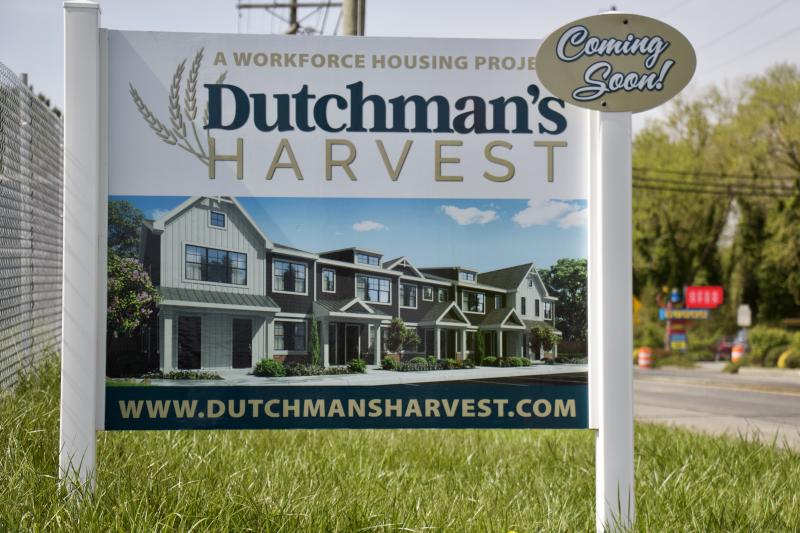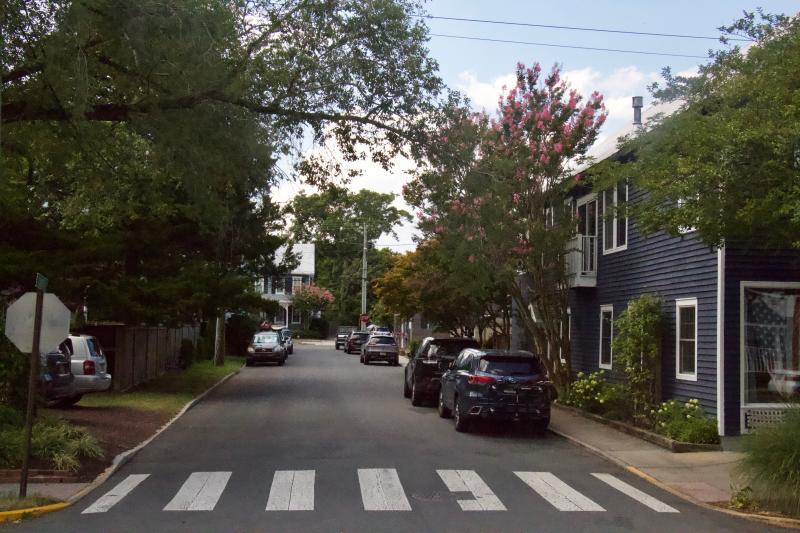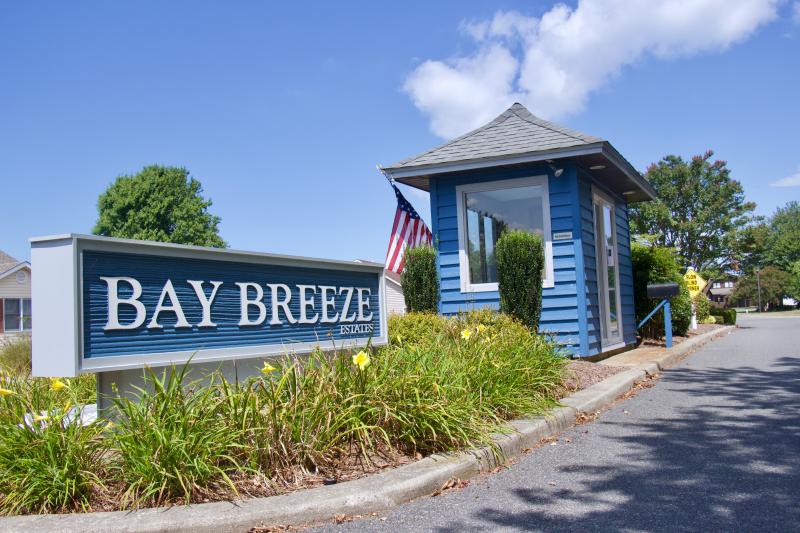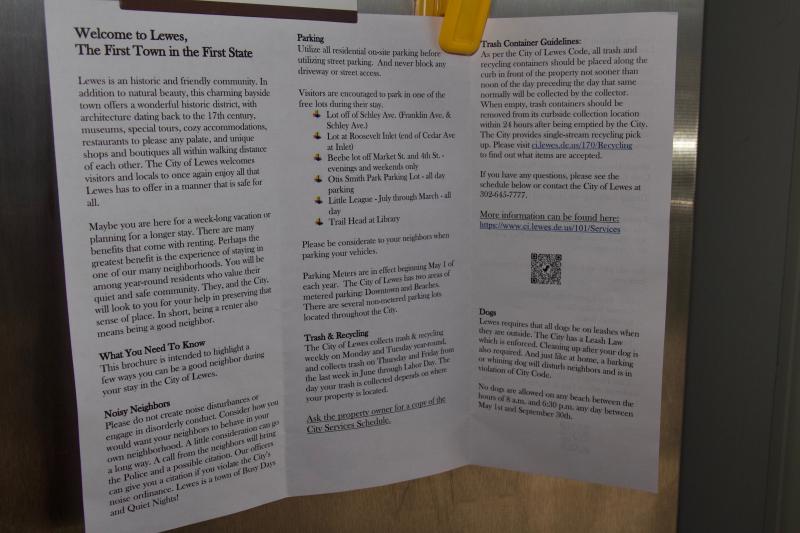The First Town in the First State has produced the first draft of rental regulations, providing a framework for the short-term rental ad-hoc committee to develop the first ordinance the city has ever had regarding the emerging business model.
An ordinance details what is required of property owners wishing to rent their homes. The proposed ordinance defines short-term rentals as 30 days or less and differentiates from long-term rentals, hotels, motels, etc. Committee members met to discuss the proposal with the public Aug. 15.
Who would need a license?
The owner of a short- or long-term rental property will need to apply for and obtain a license from the city on a yearly basis. Those operating a rental fewer than three months will pay half the fee. Licenses are non-transferable. A license holder will need to remain current with all fees and taxes while also maintaining a hospitable property. A license can be revoked if order is not administered properly, and a fine schedule has been proposed. An inspection of the property to ensure safety measures will also be required, according to the draft.
On-site requirements
The ordinance proposes short-term rentals have a properly maintained and charged fire extinguisher at the property in addition to working smoke detectors and carbon monoxide detectors. Proposed postings visible to renters would provide the license number, maximum occupancy, off-street parking sites, a floor plan indicating fire exits, the number of the local contact person, emergency numbers, evacuation routes and waste pick-up schedule. Officials have also created a Good Neighbor Brochure that contains information on etiquette and FAQs about the City of Lewes. License holders will be required to provide pamphlets to each renter.
Committee member Tonya Flickinger, who operates a Vrbo, objected to increased requirements for short-term rental operators and doesn’t understand why they would need to provide more safety items than any other property owner. Building official John Robitaillle, who also has decades of experience in firefighting, said the increased criteria is because renters are strangers who are often unfamiliar with the surroundings and layout of the home. Resident Chip Davis, speaking on behalf of his son, Gordon Davis, a current member and former chief of Lewes Fire Department, applauded the added safety measures. Davis cited the close proximity of homes in the historic district and other parts of town as reasons preventative measures are necessary.
Flickinger continued to object to informative and safety measures proposed, believing the committee is overreaching. Committee member Don Long, along with a few residents, said the short-term rental model had shifted from people renting rooms for a few extra bucks to a full-blown business. Property owners choose to enter the endeavor of their own freewill, advertise commercially, and are able to generate profits from each transaction.
Where could it apply?
The last few meetings, committee members have analyzed different parts of Lewes to see if different sets of regulations would work. It was determined that, in the interest of fairness, any regulations should be universal. Officials believe it would be wrong to restrict a person's ability to generate income and renting property is a right.
Those living in affordable or subsidized housing are not allowed to rent their homes on a short-term basis. City Manager Ann Marie Townshend said restrictions will apply at Dutchman’s Harvest and already apply at Huling Cove and Jefferson Apartments precluding residents from renting on a short-term basis.
Local contact
A common complaint among residents was the lack of investment by short-term rental property owners and renters in the community. Throughout summer, stories would be told of absentee landlords residing hours away and guests showing little appreciation for the established dynamic of the busy days and quiet nights of Lewes. For each story told of an unruly guest or property owner, there was one of a diligent rental company or individual taking the time to secure the vitality of their investment. Officials learned if there is someone who can respond to situations in a timely manner, and if the property is cared for by someone locally, then the frequency of troubles might decrease. License holders will be required to have a local contact person available 24/7/365 to respond within one hour to problems during an active rental.
Violations
A license holder could potentially lose their license if they accrue three license violations. The first notice of violation is a written warning; the second would be a $100 fine. The third notice not only carries a $200 fine, but also an immediate revocation of the short-term rental license. Anyone who has had their license revoked will be denied a new license for one calendar year. Violations include operating or advertising without a license, failure to include the permit number in the ad, advertising the rental outside the permitted scope of the license, and failure to remit all applicable taxes. Each non-compliant day following the issuance of the initial violation would also count as a violation.
Operational violations to the short-term rental ordinance include using the property for commercial or special events, failure to post all required information, failure of the local contact person to handle complaints accordingly, failure to maintain records, failure to ensure guests comply with city code, and failure to comply with any disaster or emergency orders. The fines follow the same schedule as license violations, but the revocation comes following the fourth strike and is not accompanied by a fine.
Complaints about short-term rental properties are to be directed to the owner or authorized agent on the license, but if the complainant does not feel their concerns have been addressed, then they are to notify the city’s planning and building department in writing. If the complaint is found to be valid, then a violation may be given. Anyone can appeal either a notice of violation or the findings of the investigation by the department.
Occupancy limits
The draft ordinance proposes capping the maximum occupancy at two people per bedroom plus an additional two people in the rental unit. Children under the age of 6 would not count toward the overall number of occupants. Goodman said other areas have adopted similar occupancy limits.
Final meeting
The committee will meet for the final time at 10 a.m., Tuesday, Aug. 30 at city hall. The following day, during mayor and city Council’s workshop, officials will discuss the proposed ordinance. Councilwoman Carolyn Jones, who chairs the committee, has placed a deadline of Sept. 1 for creating a final version of the ordinance. Jones and others have expressed how important it is to have the work in the hands of mayor and city council in a timely fashion so that a 2023 implementation is plausible. The meeting agenda and a link to the webinar can be found at lewes.civicweb.net.

Aaron Mushrush joined the sports team in Summer 2023 to help cover the emerging youth athletics scene in the Cape Region. After lettering in soccer and lacrosse at Sussex Tech, he played lacrosse at Division III Eastern University in St. David's, PA. Aaron coached lacrosse at Sussex Tech in 2009 and 2011. Post-collegiately, Mush played in the Eastern Shore Summer Lacrosse League for Blue Bird Tavern and Saltwater Lacrosse. He competed in several tournaments for the Shamrocks Lacrosse Club, which blossomed into the Maryland Lacrosse League (MDLL). Aaron interned at the Coastal Point before becoming assistant director at WMDT-TV 47 ABC in 2017 and eventually assignment editor in 2018.

























































